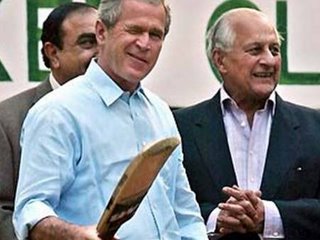After the February 22nd bombing of the Askariya shrine the media reported that 120 mosques had been in attacked in reprisals, 1300 civilians had been killed in sectarian fighting, and that Iraq was descending into civil war. This version of events was so universally accepted that even certain paleocons felt safe enough to ride the tide by declaring the War in Iraq a failure.
On March 2, ten days after the attack, the commander of US forces in Iraq, General George Casey, gave a
press briefing in which he attempted to counter some of the reports that had appeared in print. He brought the number of mosques attacked down to 30 with only ten of them taking moderate damage, and only a few of them suffering severe damage. He brought the number of civilian deaths down to 350, which he noted was unacceptable but far lower than the 1300 reported. He also noted that the Iraqi army and police force had performed well, though not uniformly so, that the government had remained united and had taken steps to calm the situation, and that the country was not descending into a civil war at this time.
The media reported on his briefing, but the Washington Post
did not abandon its original figure of 1300 civilian deaths, reporting instead the counter claims of an "international official" who said that morgue officials in Baghdad had been pressured to reduce their numbers.
On March 7, the
Washington Post reported on
a poll they had conducted which showed that 80% of Americans believe that a civil war in Iraq is likely.
An overwhelming majority of the public believe fighting between Sunni and Shiite Muslims in Iraq will lead to civil war and half say the U.S. should begin withdrawing its forces from that violence-torn country, according to the latest Washington Post-ABC News poll.
The survey found that 80 percent believed that recent sectarian violence made civil war in Iraq likely, and more than a third said such a conflict was "very likely" to occur. Expectations for an all-out sectarian war in Iraq extended beyond party lines. More than seven in 10 Republicans and eight in 10 Democrats and political independents believe civil war was likely.
In the face of the continuing violence, fully half--52 percent--of those surveyed said the United States should begin withdrawing forces. But only one in six favored immediate withdrawal of all troops from Iraq.
The claim that half of the people believe that the US should begin withdrawing forces is inaccurate. The question asked whether troop numbers should be increased or decreased. While 52% said that the numbers should be decreased, only 17% favored immediate withdrawal, while 35% said that the troops should be decreased but not all withdrawn immediately. One can favor a decrease in the number of troops without favoring a complete withdrawal. Meanwhile, 11% favored increasing the number of troops while 34% favored keeping the levels the same.
Still, the poll can be read as a measurement of the success that the mainstream media has had in painting a bleak picture of sectarian strife in Iraq after the bombing in Sammara. That is how it was presented in the article in which it was reported, and that is how it was read in many quarters.
That same day, Rumsfield gave a
press briefing in which he dwelt at some length on the exaggerations that appeared in the press after the bombing, and pointed out that they all tended in the same direction.
From what I've seen thus far, much of the reporting in the U.S. and abroad has exaggerated the situation, according to General Casey. The number of attacks on mosques, as he pointed out, had been exaggerated. The number of Iraqi deaths had been exaggerated. The behavior of the Iraqi security forces had been mischaracterized in some instances. And I guess that is to say nothing of the apparently inaccurate and harmful reports of U.S. military conduct in connection with a bus filled with passengers in Iraq.
Interestingly, all of the exaggerations seem to be on one side. It isn't as though there simply have been a series of random errors on both sides of issues. On the contrary, the steady stream of errors all seem to be of a nature to inflame the situation and to give heart to the terrorists and to discourage those who hope for success in Iraq.
And then I notice today that there's been a public opinion poll reporting that the readers of these exaggerations believe Iraq is in a civil war -- a majority do, which I suppose is little wonder that the reports we've seen have had that effect on the American people.
Rumsfield's statement is slightly inaccurate though. Looking at the poll numbers, only 1% of the respondents believed that Iraq is currently in a civil war. Of the 80% who believe that a civil war is likely, only 34% believe that it is very likely with 1% saying it definitely will happen, and another 1% saying it is already happening. The other 44% described it as somewhat likely, which at best can be interpreted as meaning that there's a better than 50-50 chance of it happening. The question does not give a time frame, so respondents could be projecting Since we have heard from the very beginning of the war about how much the Sunnis and Shia hate each other, it is not surprising that many people would ascribe greater than even odds to the possibility of a civil war in Iraq at some point in the future.
That's important because it actually suggests the opposite of what one might expect. Even though the media went through a major campaign to present a picture of Iraq torn by civil war, the public didn't buy it. Practically no one thinks that Iraq is currently experiencing a civil war. Lots of people are pessimistic about the long term prospects of avoiding one, but it's an open question whether they think it will happen while our troops are still there, or at some point after the US has withdrawn from Iraq.
Still, Rumsfield obviously believes that the media is presenting a distorted picture of the war, and that the distortions are having an effect on the American public's determination to continue the war until victory is achieved. There has been a debate in the blogosphere about whether this is the case, and in my next post I will talk more about that.


